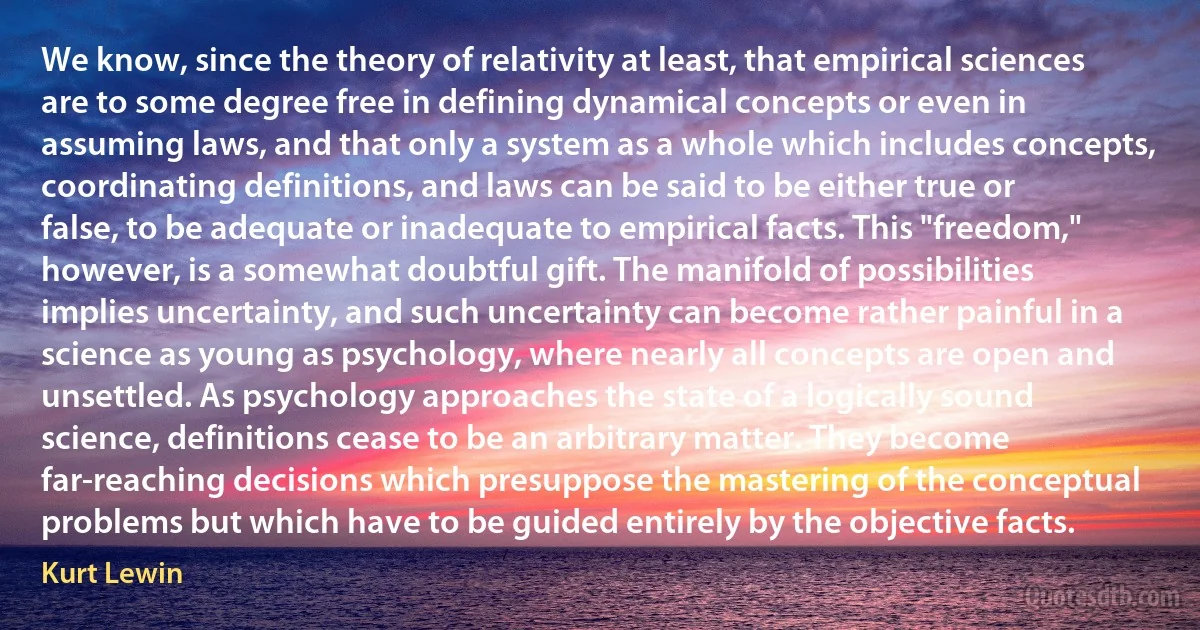
We know, since the theory of relativity at least, that empirical sciences are to some degree free in defining dynamical concepts or even in assuming laws, and that only a system as a whole which includes concepts, coordinating definitions, and laws can be said to be either true or false, to be adequate or inadequate to empirical facts. This "freedom," however, is a somewhat doubtful gift. The manifold of possibilities implies uncertainty, and such uncertainty can become rather painful in a science as young as psychology, where nearly all concepts are open and unsettled. As psychology approaches the state of a logically sound science, definitions cease to be an arbitrary matter. They become far-reaching decisions which presuppose the mastering of the conceptual problems but which have to be guided entirely by the objective facts.
Kurt LewinRelated topics
arbitrary cease defining degree false free freedom gift least manifold mastering matter objective open psychology relativity say science somewhat sound state young laws facts sciencesRelated quotes
For what advantage is it, that the world enjoys profound peace, if thou art at war with thyself? This then is the peace we should keep. If we have it, nothing from without will be able to harm us. And to this end the public peace contributes no little: whence it is said, ‘That we may lead a quiet and peaceable life.' But if any one is disturbed when there is quiet, he is a miserable creature. Seest thou that He speaks of this peace which I call the third (inner, ed.) kind? Therefore when he has said, ‘that we may lead a quiet and peaceable life,' he does not stop there, but adds ‘in all godliness and honesty.' But we cannot live in godliness and honesty, unless that peace be established. For when curious reasonings disturb our faith, what peace is there? or when spirits of uncleanness, what peace is there?

John Chrysostom
Tektology must clarify the modes of organization that are perceived to exist in nature and human activity; then it must generalize and systematize these modes; further it must explain them, that is, propose abstract schemes of their tendencies and laws; finally, based on these schemes, determine the direction of organizational methods and their role in the universal process. This general plan is similar to the plan of any natural science; but the objective of tektology is basically different. Tektology deals with organizational experiences not of this or that specialized field, but of all these fields together. In other words, tektology embraces the subject matter of all the other sciences and of all the human experience giving rise to these sciences, but only from the aspect of method, that is, it is interested only in the modes of organization of this subject matter.

Alexander Bogdanov
I adopt Mr. Darwin's hypothesis, therefore, subject to the production of proof that physiological species may be produced by selective breeding; just as a physical philosopher may accept the undulatory theory of light, subject to the proof of the existence of the hypothetical ether; or as the chemist adopts the atomic theory, subject to the proof of the existence of atoms; and for exactly the same reasons, namely, that it has an immense amount of primâ facie probability: that it is the only means at present within reach of reducing the chaos of observed facts to order; and lastly, that it is the most powerful instrument of investigation which has been presented to naturalists since the invention of the natural system of classification and the commencement of the systematic study of embryology.

Thomas Henry Huxley
During my controlled near-death experiences, I've met Sir Isaac Newton, who died back in 1727 as often as I've met Saint Peter. They both hang out at the Heaven end of the blue tunnel of the Afterlife. Saint Peter is there because it's his job. Sir Isaac is there because of his insatiable curiosity about what the blue tunnel is, how the blue tunnel works.
It isn't enough for Newton that during his eighty-five years on Earth he invented calculus, codified and quantified the laws of gravity, motion and optics, and designed the first reflecting telescope. He can't forgive himself for having left it to Darwin to come up with the theory of evolution, to Pasteur to come up with the germ theory, and to Albert Einstein to come up with relativity. "I must have been deaf, dumb, and blind not to have come up with those myself,” he said to me. "What could have been more obvious?”.

Kurt Vonnegut
In spite of all the foregoing, there is a science of economics, a true, and even exact, science, which reaches laws as universal as those of mathematics and mechanics. The greatest need for the development of economics as a growing body of thought and practice is an adequate appreciation of the meaning, and the limitations, of this body of accurate premises and rigorously established conclusions. It comes about in the same general way as all science, except perhaps in a higher degree, i. e., through abstraction. There are no laws regarding the content of economic behavior, but there are laws universally valid as to its form. There is an abstract rationale of all conduct which is rational at alt, and a rationale of all social relations arising through the organization of rational activity.

Frank Knight
